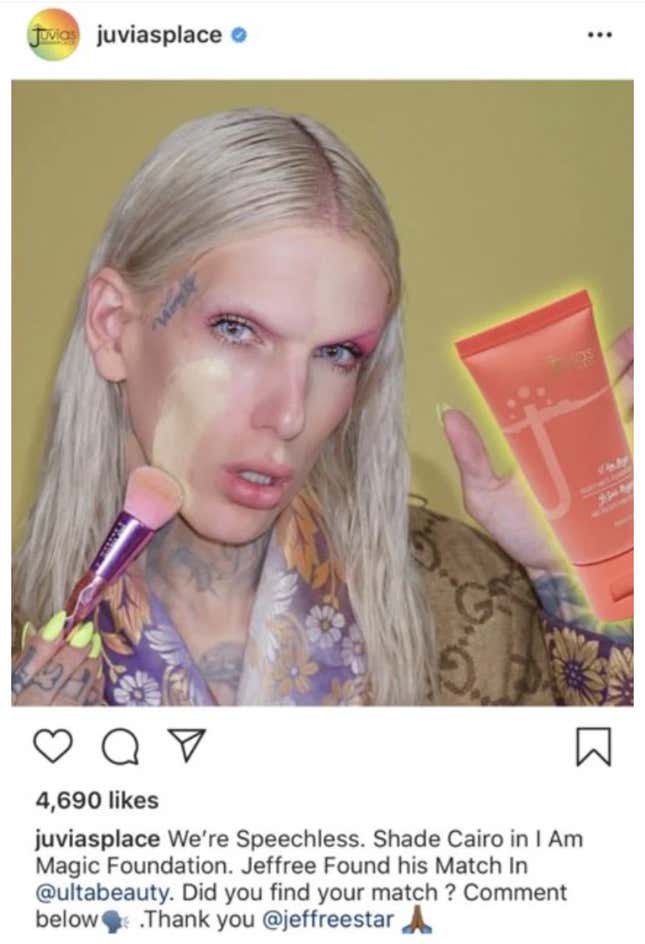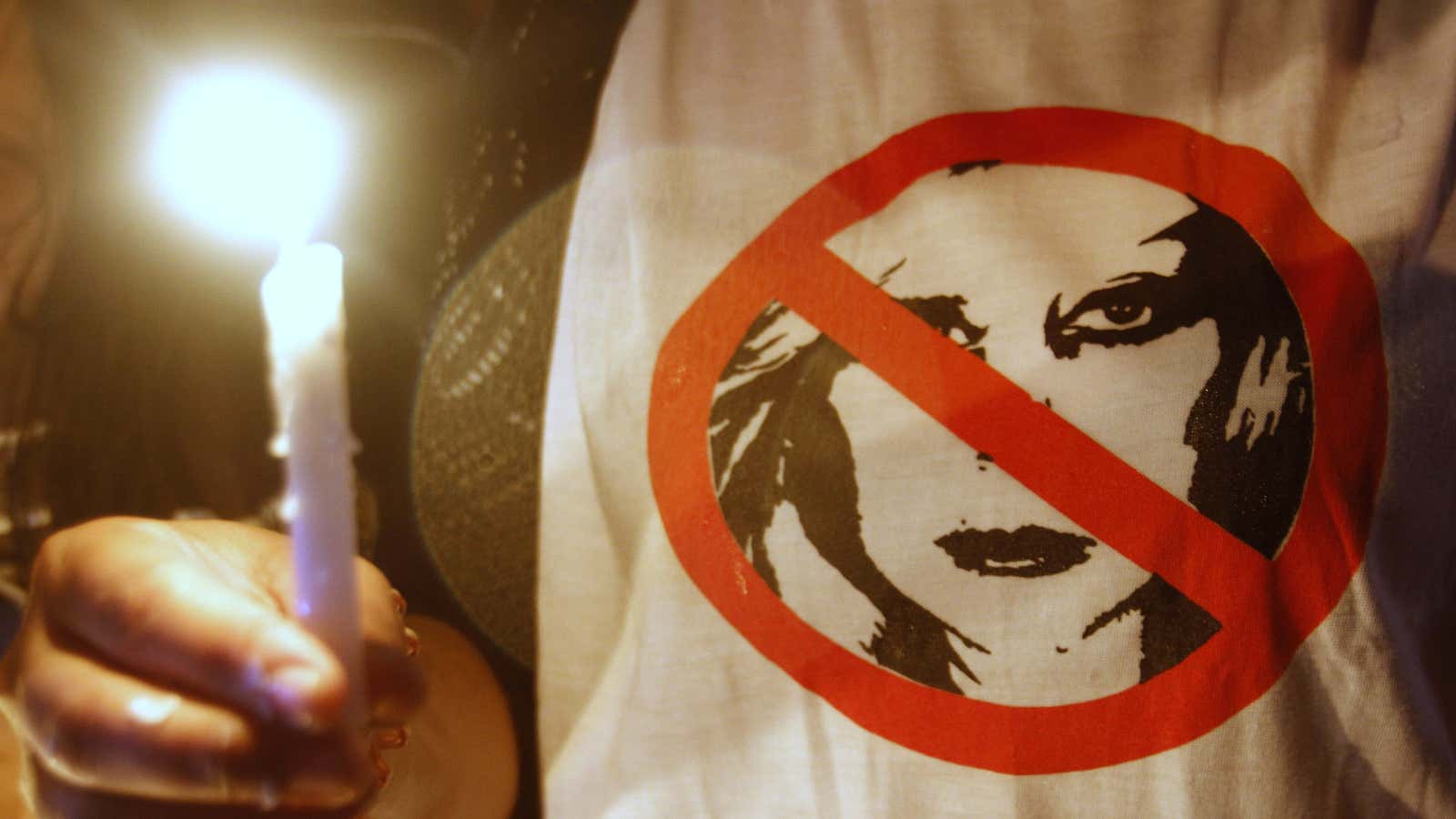In 2015, Chichi Eburu spotted a gap in the beauty market: There was nothing that represented black culture as a whole.
Sure, there were a growing number of brands offering more than 40 shades of foundation, but there wasn’t an alternative that was unapologetically and authentically tied to the beauty needs and culture of black women.
So with $2,000, the stay-at-home mom started a beauty brand out of her two-bedroom apartment and named it Juvia’s Place, after her two children. Eburu started building capital by selling makeup brushes and tools and funneled it into a palette called the Nubian. Comprised of deep bronzes and golds, she used Queen Nefertiti’s likeness to brand the palette, cementing Juvia’s Place as a makeup brand for black women, by black women. The product not only changed Eburu’s life, but according to one beauty blogger, “the way in which we view black women in the beauty industry today.”
As Eburu hit the beauty trade-show circuit in 2016, the Nubian palette went viral on Instagram after several glowing reviews, and carved out a permanent place for her in the industry.
So when the brand ventured into foundation last month, once-upon-a-time Myspace musician turned beauty vlogger and influencer Jeffree Star made sure he was amongst the first to check out the new product. He rushed to mega beauty store Ulta to pick up several shades before trying them out on camera. He was “thoroughly impressed,” according to his review. “For an indie brand to come on the market with their first-ever foundation, they’re killing it, let’s just say that right now,” he said.
With more than 15 million YouTube followers, the words “Jeffree Star approved” can make or break a product. So naturally, Juvia’s Place posted about the review on their Instagram, thanking the influencer for his support:

Almost instantly, the brand was hit with brutal backlash online. “Is it a trend among black businesses to say F*CK BLACK CONSUMERS upon reaching a certain level of fame even tho those same consumers were there from day UNO?” one critic commented.
And just like that, Juvia’s Place was “canceled.”
The brand was rejected not just by consumers, but by the same black beauty influencers who helped Juvia’s Place achieve its level of success. Many now refuse to support the brand in any way, shape or form.
And even though Juvia’s Place has since deleted that post, the damage has been done.
The new boycott
Cancel culture, also and perhaps more formally known as call-out culture, is the boycott of the social media economy. It occurs when social media users publicly call out brands and celebrities from missteps.
According to Urban Dictionary, “In pop culture, canceled means to make someone or something irrelevant due to current drama.”
It’s also defined as “to dismiss something or somebody. To reject an individual or an idea.”
Think of it as a boycott for the attention economy. Rather than refusing to buy a product or service from a brand that has views that differ from our own, we refuse to pay attention to a brand (or person, an influencer) that has views different from our own. We stop following them, reducing their follower count, and therefore their value in our social media-driven economy.
Sometimes, this is a useful way to ensure social accountability, as when celebrities and executives have been outed for abusive behavior. But mob-mentality social media campaigns also risk sweeping undeserving brands along in a controversy, and overlooking important complexities in the process.
The “drama”
So what exactly happened? Despite having amassed a massive social following and being the fifth-highest paid YouTuber, Star, has a well-documented history of making racist comments. And, for a brand that proudly positions itself as part of the “for us, by us” culture, celebrating the beauty vlogger’s influence felt like a betrayal for many—and inauthentic at the very least.
Rather than propelling a fledgling start-up to the mainstream, Star’s review—or more specifically, Juvia’s Place’s celebration of his review—was enough to effectively cancel the brand.
The irony is deafening. After videos of Star making racist comments hit the mainstream, he issued a heartfelt apology that seemingly absolved him, or at least protected his follower account, and removed him from the brink of cancelation.
In the video, he acknowledged the weight that being a social media influencer held. And the controversy seemed to die down.
The case of Star illustrates that there is a good social function to the act of canceling—just like their traditionally is for socially conscious boycotting. By reducing the cultural cache of those in power, it forces them to change behavior that we deem socially unacceptable. It’s how we assert our power, and it can be used as a force for good.
Not all canceling is created equal
Juvia’s place is a black-owned brand, which was canceled by black influencers because of a controversial endorsement. But what does it say about our society that we’re so quick to cancel Juvia’s Place, yet so forgiving of someone like Star and the global brands that make potentially harmful public mistakes on a massive scale—think Pepsi, H&M, Nike, Dove, Uber?
It’s a complicated web of accountability and resources, as it turns out.
By canceling Juvia’s Place, consumers stripped it of its cultural relevance, and power. In many cases, established or legacy brands survive in this cultural minefield, while small brands struggle, because large brands can still buy our attention spans, while small brands rely on word-of-mouth and influencer marketing. Smaller brands, and especially smaller minority-led brands, simply don’t have the reputation or resources to course-correct, further empowering the untethered reach of the corporations that do.
Peak culture?
Looking at how we use the word cancel gives us insight into how we’ve reached this tipping point. Cancel culture is particularly rampant in the beauty industry. James Charles, the first male face of CoverGirl, was absolutely obliterated after feuding with another beauty YouTuber, losing more than 3 million followers on Instagram over the course of a few days. Kim Kardashian was almost canceled after initially naming her shapewear line “Kimono,” which social media users deemed culturally insensitive.
Cancel culture is so rampant in the beauty industry because the market is so defined by influencers. Beauty influencers market themselves as personalities, and are therefore judged and consumed as personalities. If consumers dislike features of a product, they usually dismiss it. If fans dislike the ethos of an influencer, they do the same.
But as influencers become more and more, well, influential, in other industries, and we become more and more used to interacting with brands, products, and services on social platforms, cancel culture is growing. And potentially, we’ve reached peak.
Yara Shahidi—canceled. Shania Twain—canceled for vocally supporting Trump. Kanye West—canceled for reasons he explains himself: “I’m canceled. I’m canceled because I didn’t cancel Trump.” And most recently, in perhaps the most 2019 moment of the year so far, the Dalai Lama was canceled following sexist remarks.
Influence imbalances
Brands and celebrities used to wield so much power, it bordered on arrogance. A brand could espouse its belief on people with little fear of ramifications. Think about all the examples of advertising from the 80s, with exclusionary messages of Americana and the good life at the forefront.
My, how the tables have turned. Now consumers risk acting with the same sense of arrogance. With the help of influencers, they wield incredible power over a brand’s reputation, in the form of online commentators waiting on the sidelines for someone to make a wrong play. This comes with a justification that online commentators determine what’s right and what’s wrong.
It’s getting dangerous. We live in a world where the simple and dichotomous statements of one two-syllable word can doom a brand. But unlike a boycott, the word canceled bars any chance for redemption.
With cancel culture, we’re facing the tyranny of the masses. Much like French historian Alexis de Tocqueville concluded, perhaps we need a balance of power to check ourselves. In a social-media-driven world, if consumers wield the power and influencers have become our new representatives, do brands need to act as the judicial branch?
Brands could hold influencers to higher standards, much like the judicial branch holds the executive and legislative branch to constitutional standards in the government. If influencers represent the masses, they are political representatives and need to be held to the same level of scrutiny that we hold our candidates. There should be rules of engagement, influencer watch-dogs, and audits of influence and importance.
Cancel culture will only become less brutal if we change the way we react to it. Let’s stop looking at things along such dichotomous lines and stop being so afraid to make missteps. We need to own when we get something wrong, and start asserting our power and our social responsibility on others that do, too. But most importantly, we need to be more constructive about it.
Can we cancel cancel culture? (No.)
The point is, cancel culture can’t be canceled. You can’t take away someone’s right to assert their opinion, even if the way in which it has manifested is toxic. Large brands and celebrities should lead the way in changing the narrative around cancel culture, and restore its original intent.
A colleague of mine asked what I would do if I was the founder of Juvia’s Place. After reflecting on it for a while, I realized it would be a moment to assert my own values, without calling out someone else’s: “Thank you for recognizing us. We know you have great influence and your endorsement is powerful. But we would be remiss if we didn’t call attention to this and the furor of many of our own followers. We take our role seriously and believe this is an opportunity to channel our user.”
But we all know hindsight is 20/20. The reason cancel culture continues to rule brands, and the reason it is so powerful, is that it often preys on the unintended consequences of an action or a remark. Perhaps brands can lead here by imparting the PR-minded strategies of considering all the consequences for a remark, and reposition their power as leaders in the public sphere.
